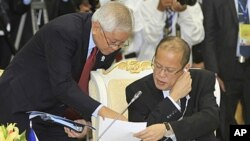Southeast Asian leaders say they will rush to reach a unified position on resolving competing territorial claims in the South China Sea. During the final day of a key Association of Southeast Asian Nations leaders summit in Phnom Penh, negotiators struggled to reach a consensus on how to approach the disputes with China.
The maritime dispute has become increasingly heated in the last year. China claims ownership of much of the South China Sea, along with four ASEAN states, including the Philippines.
On Wednesday, ASEAN chair Cambodia issued a statement saying that the ten member states have agreed to "intensify efforts" on agreeing to a code of conduct, or CoC, on the dispute.
The question that ASEAN leaders sought to answer this week, is whether China would be involved in those discussions before the group had reached a consensus.
"It must be resolved peacefully in accordance with a rules-based regime and the new element that we've introduced is that the drafting of the CoC and the inclusion of the major elements should actually made by ASEAN internally before China is invited," stated Albert Del Rosario, the Philippines' secretary of foreign affairs.
ASEAN officials said Wednesday's pledge to expedite the process is an attempt to reach that consensus as soon as possible.
But the next scheduled meeting on the issue between China and ASEAN is only months away. On Wednesday, other ASEAN leaders said it was important to have a common position in any regional negotiations, but they also left the door open to China's involvement.
"This is not necessarily a neat sequential process isn't it. Of course, ASEAN … first and foremost, must have a solid consolidated position," said Marty Natalegawa, Indonesia's foreign affairs minister and a former ASEAN chairman. "But at the same time as we proceed, there will be constant communication through the ASEAN-China framework, so that whatever final position ASEAN comes up with will have benefited from having some kind of communication with China," he said.
It has been 10 years since ASEAN members first agreed in principle to reach a consensus on the South China Sea. Yet member nations still have failed in seeking a common approach to govern negotiations with China. The issue has become increasingly heated in the last year, particularly with maritime confrontations between China and the Philippines.
Although they failed again to reach a consensus, Natalegawa says this week discussions were a positive step.
"The big picture is one that must not be lost … now we have a situation where all are basically rushing to get the CoC off the ground. Which was not the case before. Now we have China wanting to come in and ASEAN wanting to finalize the CoC as soon as possible," said Natalegawa. "This is all good dynamics."
The next ASEAN leaders' summit is scheduled for November, also in Cambodia.




